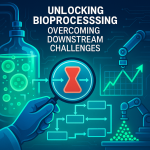📈 This innovative medium boosts yields for proteins like eGFP and human cytochrome c, achieving up to 50-fold efficiency improvements.
🧬 With higher total protein yields and success in dual expression systems, it offers a cost-effective, versatile alternative for research and commercial applications in protein production.
Introduction:
This article discusses the recent development of a novel auto-expression medium termed “Bosco Broth,” which utilizes galactose instead of lactose for the T7 expression system in Escherichia coli. This innovative approach not only enhances protein yields but also holds promise for more efficient protein production processes in biotechnology applications.
- Bosco Broth improves yields of various recombinant proteins by utilizing galactose for auto-expression, offering significant enhancements over traditional lactose-based methods.
- The medium demonstrated reproducibility, achieving an 8-fold increase in yields of Streptococcus pyogenes Cas9 at 95% purity and significantly improving production metrics compared to other broths.
- In a dual expression system, Bosco Broth achieved a threefold increase in the production of human cytochrome c compared to standard protocols, indicating its effectiveness in co-expressing proteins.
- Notably, Bosco Broth supports the expression of proteins with challenging disulfide bonds and operates efficiently in SHuffle T7 E. coli strains that cannot utilize lactose.
- Research is ongoing to understand the underlying mechanisms that enable higher soluble protein outputs, with plans for commercial application through Arktos Life Sciences.
Conclusion:
The introduction of Bosco Broth as a galactose-centered auto-expression medium represents a significant advancement in protein production methodologies. Its ability to enhance yield, particularly in complex systems, positions it as a superior alternative to traditional lactose-based methods, potentially revolutionizing practices in recombinant protein production. Ongoing research promises to elucidate the mechanisms behind its efficiency, paving the way for further optimizations in biotechnology applications.



